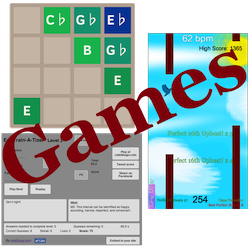For years I have had a sound in my head that I couldn’t manage to produce until I discovered and purchased Logic Pro 8 and began to play and compose with it. I quickly discovered Sculpture and began to create the sounds I have always wanted to hear. Having played drums all through high school, I quickly learned how to connect my Yamaha DTXpress to my iMac, and proceeded to perform and manipulate the intricate rock patterns that many fellow musicians often criticized when I was in high school. Had anyone (including myself) known what was going through my head when I played, my style of drumming may have been better received and used more effectively. However, my high school rock drumming days have now been channeled into my true passion for classical, or polyphonic, composition.
Between growing up in an environment saturated with popular music and my recent intensive studies in music theory, composition, and performance, I became passionate about writing a work that would fuse the genres within classical music to the sounds and rhythms I had been playing with for the past nine years. It is my belief that I have successfully done this and I hope much more:
During my training I obviously was required to be exposed to a wide variety of classical literature. At first I was apathetic but still listened because I knew that it would be good for my work in composition. However, I quickly realized that its value was deeper than simply helping me to gain musical understanding. I was beginning to connect with the music emotionally, particularly with the works of Tchaikovsky, Shostakovich, Barber, and several others. There was beauty in the larger formal structure, something captivating in the virtuosity of the performers, and profound wisdom in the compositional techniques which I noticed and began to take to heart. Yet in the midst of this intellectual pleasure, I still listened to the best of the rock and jazz that I had. My love for both genres was developing and was coming out in my compositions. Now I believe that it has come out to the extent of forming a work that will appeal to both exclusively classical musicians and contemporary musicians.
My dream for the past two years has been to write a work that will bring listeners of popular music back into the concert hall. Although I still listen to a few contemporary artists, I am becoming more and more in love with classical literature both recent and ancient. Do not misunderstand, it is not my goal to convince people to stop listening to popular music entirely (for this would be tragic), but I desperately want people to take a step in the direction of music that is of high enough quality to stand the test of time. My first symphony, Context, is the work that I want to send out into the world to begin this process for the people that are interested.
Context truly is an electronic symphony by definition due to the fact that it follows the classic form of the symphony quite closely. The term “symphony” is often used flippantly, but in this case I intend it to mean what it has always meant: a large work for a large ensemble that shows what the composer was capable of at that point in his life. Since this project fits into this category and was designed to do so, the listener must know a few things about how to listen to a work of such magnitude.
Usually when we listen to music we don’t expect one musical idea to last more than five to ten minutes. In popular culture three to four minutes is all a person’s attention span can take. This work on the other hand takes forty-five minutes to listen to and must be understood as a whole in order to get the most out of the listening experience. Throughout this work, there are two motives that are used excessively, which is why you may notice that even when the music seems chaotic you can still understand it. This tends to happen at the subconscious level, but when studied and analyzed you will find that it makes perfect sense for your mind to keep being drawn into music. Using this motivic material and developing it further makes it possible to unify even hours of music into one coherent idea without losing the interest of the listener. The listener should therefore not only listen to the sounds themselves as they come in and out of perception, but as they get to know the piece better should concentrate on perceiving the entire work on the massive level in which it exists. Only when the medium of time is eliminated completely can this piece or any piece for that matter be enjoyed up to its potential.
The sounds that I have developed is a topic that I hope musical critiques will deeply address someday. I have taken the new technology from Logic Pro 8’s Sculpture and have used it exclusively for this project. Outside of the percussion every sound has been engineered from scratch using Sculpture and done without previous outside training in sound engineering. This is to the credit of Logic’s developers at Apple. The software is so intuitive and straight forward that composers of electronic music no longer have to know anything about programing in order to successfully achieve good sounds. I hope that my use of this technology will inspire more musicians to create with this technology and to keep music moving forward into a new and unexplored frontier.

